|
Delighted to share with you the product of my first European collaboration with Tim Dempsey, a practical handbook for businesses on how to navigate the perils and opportunities of the fast-moving world in which we live, released this week by Lloyds Bank for Business, one of the UK's leading banks.
To read my introduction, please click the image below. You can also download the entire book in PDF or EPUB format here. This follows an earlier collaboration in Australia with TIm, ASX and NAB on The Entrepreneurs Guide.  A year has passed since the effects of the COVID-19 outbreak first began to be seriously felt in the West. For most, it has been a challenging year both at work and at home, and plenty of uncertainties still lie ahead. Nevertheless, technological development has continued apace, not least with the development of multiple vaccines in record time. Meanwhile, the immediate pressure on businesses and governments to deliver short-term results remains as high as ever, making it hard to find time to position your business – or country – for what lies ahead in 2022 and beyond. That said, powerful technological shifts are happening in several major industry sectors, creating opportunity for those that can find the time to think through the implications and begin to act. In Dawn Patrol, Nigel Lake share’s his perspectives on what is unfolding and how best to ride the technological waves as they build momentum. Read on>>>  pottinger_2020_us_election_commentary_no_1_update_3.pdfThe US Federal Election is just eight weeks away. Though the politics are more vicious than ever before, both sides agree on one thing – the outcome of this election will define for decades to come what it means to be American, and what America means to the world. America is changing in an unprecedented manner and the implications are global in reach and impact. As a result, there are new opportunities and new risks that must be factored into decision-making by senior leaders inside and outside the US. In The Dark Is Rising, our founder Nigel Lake unpacks a dozen shifts that are rewriting the rules of business, politics and economics in the USA. If we can help you grapple with what these issues mean for your business, please give us a call.  The impact of the ongoing Robot Revolution has been catapulted forward three to five years or more, creating permanent economic shifts. Though the near-term effects are painful for many, individuals, businesses and governments should seize this opportunity to renew their thinking, refocus their effort and retrain to help create a better, more resilient economy and society. Click the image to read the report or watch the quick summary below. Join Nigel Lake and Paul Herman with special guests
 Too much attention has been focused on filling the income gap that many people and companies now face and too little on reducing expenses and liabilities. As a result, there is a growing risk that the current health crisis and economic downturn turns into a massive liability crisis, triggering a Second Great Depression in many developed economies. Let me explain! >>> 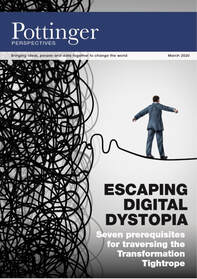 Since Y2K, agile blackbelt big data devops scrums onboarded scale cloud deployment stacks, gamifying paradigm shifts in legacy siloed cyber architecture. A digital transformation. But you knew this already. The tech industry owns jargon like it claims to own innovation. Business used to be enabled by technology. Today, technology drives business, though not always in a successful direction. So, if you are fundamentally reshaping your business, there are seven things you must watch to ensure that you do not become a prisoner of the technology you adopt... >>>Read on  Australia is one of the strongest economies in the world. We are rich not simply in our natural resources, but also in our magnificent environment, pristine agricultural supply chain, extraordinary indigenous heritage and resourceful and creative people. Australians deserve much better than an age of ignorance. We need leaders who put innovation, entrepreneurship and long-term thinking ahead of sound-bite opportunism – leaders who trust in independent analysis and objective decision-making, not party-political rhetoric. Our editorial provides further background (click the image above or here). We also invite you to browse through the Pottinger Manifesto here, and add your voice to our movement to help deliver an even stronger Australia. If you like what we're saying, please share so that our collective message is amplified as loudly as possible! 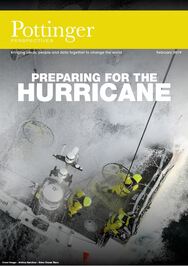 Many countries and industry sectors are heading into the most turbulent environment seen in the last century. Three simultaneous industrial revolutions, dramatic increases in competition, huge fiscal imbalances, growing geopolitical tensions and a fractured social contract are combining to create a veritable smorgasbord of risk and uncertainty. The hurricane is gathering force and stormy weather lies ahead. Yet these same factors also imply that this will be the best possible environment for strong businesses to outperform. How can you make the most of this opportunity? Read on >>  There is a cold bite in the air. It aches and alerts in equal measure. Despite the chill, it is a sunny day at altitude, and very quiet. My skis are perched on a ledge at the start of a run with a characteristically threatening name. There are only two other adventurers in sight – one glides effortlessly in the distance having conquered today’s challenge. The other sits entangled in a mess part way down the hill. One, two, three - - - go. Read on... for John Sheehy's take on five snowsports lessons for your business. 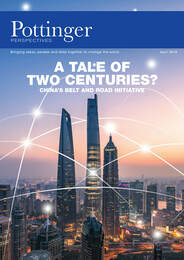 The world’s greatest economies have been built on international trade and investment. From the Greek and Roman Empires of ancient times to the Ottoman Empire and British Empire, global commerce has created huge wealth and unparalleled economic advantage. Meanwhile, every century or so, technological development and political decision-making have combined to catalyse significant shifts in the global balance of power. In the UK, this included the advent of steam power, mechanisation of manufacturing and adoption of steel-hulled ships for transport during Britain’s industrial revolution. Scientific and industrial innovation thus enabled the creation of the largest, richest and most powerful empire of all time. Much of that technology and experience was exported to the United States, enabling the construction of the railroads and creation of the United States of America, creating the military, financial and technology powerhouse of the 20th century. The same is true for the world’s greatest commercial enterprises. The world’s first companies – the Dutch and British East India companies – were formed around 1600 to pursue international trade. At their peak, they both owned merchant navies with massively more ships than any country has today. Today, the five largest listed companies in the US are Amazon, Apple, Facebook, Google and Microsoft, three of which are barely twenty years old. Importantly, all have built their success on innovative new technologies, and all five have businesses that are global in nature. Importantly, these five companies alone have accounted for a material part of overall stock-market growth in the US since 2000. Collectively, they have a market value of $3.5 trillion, more than the entire capitalisation of Australia’s Stock Exchange. So, it was with great interest that I attended the Belt & Road Trade and Investment Forum in Beijing last week. Read on... 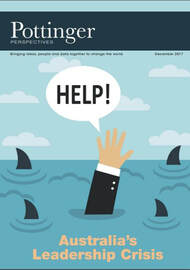 We have a leadership crisis in Australia and it is hurting our nation on the world stage. In our latest Pottinger Perspectives piece, Nigel Lake revisits the startling lack of ambition in certain corners of Australia’s public and private sectors. Innovation, technology, digitisation, renewable energy and so on – the list of 2017 themes of disruption goes on, but the structural, political and personal inhibitors to Australia’s next era of growth – one that is not dependent on the old economy principles of our past successes – are standing in the way. We invite Australia’s leaders to stand up from the crowded mass of the status quo and make bigger, bolder and braver decisions.  Most of the first wave of tech unicorns and start-up billionaires were B2C businesses. The likes of Amazon, Google and Facebook started out by solving problems for people, rather than for companies (even if the latter two ended up making most of their revenue from corporate customers). As a result, the technology landscape has changed massively for consumers over the last 15 to 20 years – arguably much more so than it has the workplace. But dramatic changes are afoot. There is huge excitement about the potential of B2B tech companies to have a transformational impact on many aspects of business. Massive amounts of capital are flowing into a new breed of start-up, focused around the tech hubs that have emerged over the last couple of years. A host of new buzzwords has been created - FinTech, HealthTec, AgTech, MediaTech and the like. Early starters like Palantir, Tableau and WeWork have created huge value for their shareholders. And at the other end of the alphabet, Australia’s Atlassian demonstrated that this can be achieved without the need for much external capital at all. But the barriers to B2B success are huge. Read on... for our take on the 12 pre-requisites for success as a would-be B2B unicorn.  A Consultant, Banker, Lawyer, Psychologist and Engineer walk into a bar… “This feels like a joke!” says the Psychologist. “Oh, don’t start all that again,” says the Banker. “We’re just here for a drink.” The five experts take a seat at a round table in the middle of the room. Shadows are cast across their faces by the low-hanging light above them. The room is dimly lit and rain taps against the single-glazed window beside the door. It is a Tuesday. “What will it be?” asks the Waiter, placing two menus on the table. “Wine,” say the experts in unison. They smirk. The Lawyer chuckles. “We might need a minute or two,” says the Engineer, fully aware of his own inexactitude. The Consultant picks up one of the menus and holds it firmly in two hands. “OK people – let’s start with the universe of opportunity and narrow things down from there.” “We’ll be here all night!” says the Banker, impatiently. “Just look at the prices and pick something good.” “Work with me on this – red, white or rosé?” asks the Consultant. A gust blows and the door of the bar rattles on its hinges. Read on...  Many of the world’s largest and most successful businesses have been built by mergers and acquisitions. From Sinopec to Facebook, Pfizer to Mizuho, Time Warner to Unilever, M&A has been a crucial contributor to the success of each business. But of course the reverse is also true – some of the world’s largest and most disastrous corporate failures have been brought about by ill-conceived, ill-timed, or poorly executed transactions. Chroniclers are fond of reminding us that history repeats itself. This seems as true in the corporate world as anywhere else, no doubt because many of the lessons of recent events are so often ignored. With the world economy already a decade into the low growth era, boards and executive teams are under more pressure than ever to buy their way out of the financial doldrums. Meanwhile the cost of debt is at 5000 year lows, and equity markets are not far from all time highs, making both transformational and catastrophic acquisitions easier than ever to finance. With these exceptionally difficult choices in mind, we’ve looked back over the last thirty years of M&A to identify the root causes of the more epic disasters. These are the Seven Deadly Sins of M&A: the warning signs that boards, CEOs and advisors can and must look out for in the year ahead. Read on...  ‘It’s smaller than I thought’ -- a common phrase overheard in the presence of Da Vinci’s Mona Lisa hanging in the Louvre museum in Paris. A wildly undeserving observation, however, when thinking about the impact of the painting and its meticulous execution. Likewise with successful joint ventures. Joint ventures can be an efficient way to add scale, avoid the risk of an outright acquisition, enter new markets and create new business relationships. But they also bring huge risks and uncertainties when undertaken in the dark. If would-be partners don’t think through strategy and execution carefully in advance, they are more likely to destroy value rather than create it. Small partnerships can create disproportionately large and painful problems, whilst large ones frequently fail to create much value at all. Happily, art provides a compelling framework for bringing light and clarity to the creation of joint ventures, as we explore below. Read on...  I read with some alarm about the BA plane bound for Dusseldorf that ended up in Edinburgh by mistake. But - I have a confession. I made a similar mistake once myself one Easter! We were trying to sail from Jersey to Guernsey. A short while into the trip, it seemed that the boat’s compass was pointing in the wrong direction. As time went by, the error increased… Those that know the waters will understand the very real risks involved, particularly given the icy water in the English Channel at Easter time. In retrospect, however, it for some good life and business lessons! Read: The Accidental Circumnavigation of Sark.
 Australia is in crisis. Not economically – despite slowing growth, the domestic outlook is still one to which nearly all other major economies can only aspire. As one senior diplomat put it last week, “Australian growth is slowing to a pace that we are still striving to achieve”. Whether judged by economic growth, or the budget position, or debt to GDP, Australia is enormously more resilient than many other major nations. Of course this is no cause for complacency – it remains important to bring the budget back into balance in due course. But when it comes to the country’s mindset, it is surely time to hit the reboot button. >>> Read the full article here 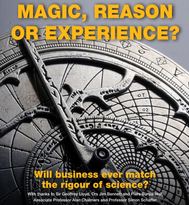 Will business ever match the rigour of science? The notion of modern day science emerged in the early nineteenth century – William Whewell coined the term scientist in 1833. Before that, anyone investigating how the world worked was known as a “Natural Philosopher”. As a concept, “science” is much more than simply a word that represents technological development and invention. At its heart, it is a methodology for gathering the right data or facts, analysing them in a rigorous and reliable manner, and interpreting the findings and assessing their meaning. It is a process for evaluating theories about how parts of the universe really work, examining “proof”, and hence arriving at “truth”. Thus science is a philosophical paradigm. It is designed to support the development of thinking, increase in human understanding, and reliable decision-making. Every half-decent scientist understands the scientific method, and the importance of how experiments are run, data is gathered and ideas are tested. Unscrupulous researchers may seek to bend the rules or bend the data, but the global community of peer reviewers who subscribe to the scientific method will scrutinise their data, their analysis and their findings. There is no “bend it like Beckham” when it comes establishing the veracity of a new theory. This process – this philosophical paradigm – has been responsible for the most dramatic period of technological advances and associated economic development that the world has ever seen. It is no co-incidence that the industrial revolution followed hard on the heels of the birth of the scientific method. Since the start of the industrial age, there has been technological revolution after revolution, with the pace of change accelerating decade by decade. As one example, the smart phone has changed the lives of billions of people in the seven short years since the iPhone was born. So it is nothing short of remarkable, then, that the same rigorous approach to gathering and evaluating data and reaching conclusions has never been brought to the world of business. Read on...  We’ve all heard of the concept of the bucket list – the things that you really want to do before you die. But have you ever thought of making a bucket list for your company? The cold hard truth is that very nearly all organisations will meet with the corporate undertakers in the end. As an example, the world’s first company, the Dutch East India company, was founded in 1602. At its peak, it employed nearly a million Europeans. Once richer and more powerful than most nations, it eventually died an ignominious death, appointing receivers in 1800. And at the other extreme, the large majority of small businesses and start-ups fail, the majority of them before their tenth birthday. The last two decades have seen the spectacular overnight insolvencies of some of the largest businesses in the world. Some, such as Enron and Bear Stearns, were simply allowed to die a natural death. Others, including some of the largest American banks, were shepherded into the arms of larger, stronger organisations, allowing at least parts of the business to survive. In every case, those who were involved in the oversight and management of the companies in question will surely have had regrets as the new landlords or administrators walked in the door. And for many of the employees, the impact was profound, including lost jobs, lost investments, unexpected career changes and worse. Read on... |
Pottinger PerspectivesOur take on issues that are changing the world, and how you can make the most of uncertainty Categories
All
|
|
We pay respect to Traditional Custodians and First Nations peoples everywhere, including the Gadigal People of the Eora Nation and the Lenape
|

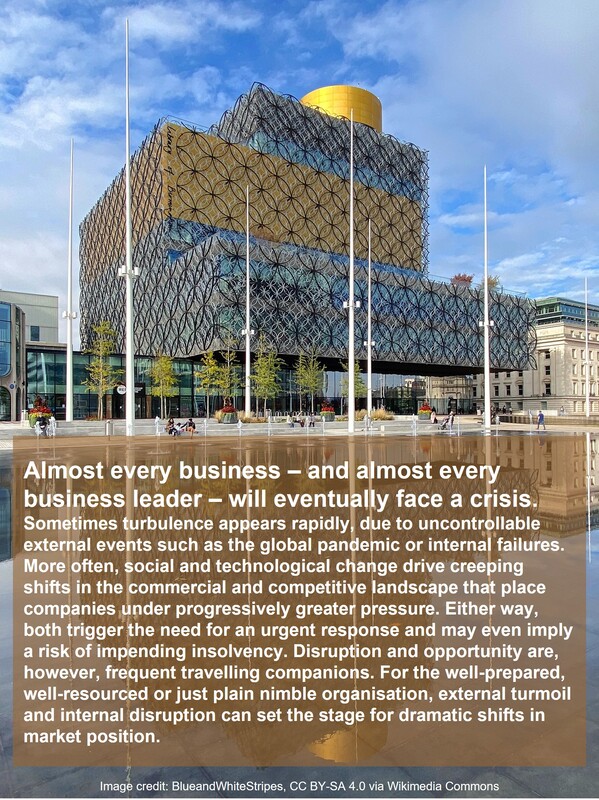
 RSS Feed
RSS Feed